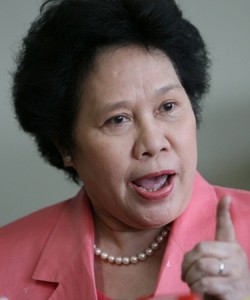MANILA, Philippines–Senator Miriam Defensor-Santiago on Sunday warned that Malaysia might be violating certain freedoms of Filipino journalists covering the Sabah crisis with its continued refusal to allow them access to persons they want to interview.
“I can say categorically that in banning journalists from covering the (events in) Sabah, Malaysia is incontrovertibly violating the international human rights, particularly the civil and political rights (of the journalists),” the senator told a radio station.
Santiago, a member of the Senate foreign relations committee, was apparently reacting to reports that Filipino media, including the Inquirer and at least two major local networks, were turned away barred from interviewing Filipinos detained by Malaysian authorities over the weekend.
Filipino diplomats who planned to aid consular assistance were also reportedly barred from doing so as they had no permission from the Malaysian government.
Santiago recalled that journalists who covered the Vietnam War in the mid-1960’s were allowed unhampered access during their coverage.
“The Vietnam War (in effect laid the ground that) any journalist can cover a war, even those engaged in it … It was first uncensored war,” the senator said.
“Even during the Iraq War, in the 1990’s, the rules of coverage changed (“nagkambiyo”). Not only do journalists have right in international law to cover actual combat but they also can be embedded in (a country’s) armed forces. And if captured, they are entitled to special treatment and not be treated as prisoners of war but as civilians,” added Santiago, who is awaiting her summons from the International Criminal Court to begin her six-year tenure as a judge.
As it is, the senator said “more and more protection is now given to journalists (covering) actual combat. This practice is repeated and authorities in international law like the United Nations and other tribunals all agree that this is part of the human rights of journalists. Kaya kung binabawal mo sila, that is a violation of their human rights and therefore a violation of international law.”
“We can insist on that because we are on right side of international law there (in Malaysia),” she stressed.
